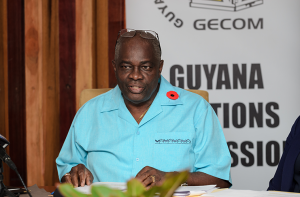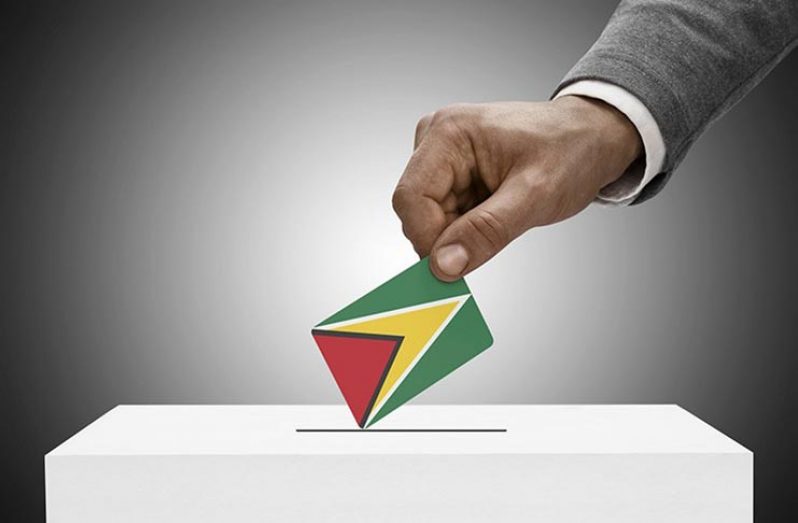THE Appellate Court has affirmed that the Chief Elections Officer (CEO), Keith Lowenfield, must ascertain a winner of Guyana’s 2020 General and Regional Elections from only valid votes cast. However, to understand what constitutes a “valid” vote, one must turn to the Constitution and the laws which guide Guyana’s current electoral process.
Currently, the nation awaits the completion of the ongoing national recount process which must next see the handing over of the CEO’s report to the Guyana Elections Commission (CEO). The entire national recount process is being guided by Order No. 60 and its addendum which were crafted by the Commission and which outline what determines a “valid” vote.
THE RECOUNT ORDER
The national recount Order was made by the Elections Commission pursuant to its powers under Article 162 of the Constitution and Section 22 of the Elections Laws (Amendment) Act, No. 15 of 2000. It was gazetted on May 4, 2020. It first outlines that though the declarations for each Region were made, aspects of the process were subject to legal proceedings. It then explains that an agreement was forged between President David Granger, Leader of the Opposition, Bharrat Jagdeo and CARCOM, for the conduct of a national recount of all ballots cast.
The Order then outlines that the Elections Commission agreed on April 3, 2020 to the recount and was therefore expected to determine the terms of reference and modalities of the recount process. Based on agreements made at the Commission level the Order next outlines that the recount process shall be undertaken and executed by GECOM, scrutinised by a CARICOM Team and conducted in the presence of political party representatives and local and international observers.

Detailing next how the ballots should be counted, the Order states: “AND WHEREAS the Guyana Elections Commission, in exercise of the authority vested in it under Article 162 of the Constitution and pursuant to Section 22 of the Elections Laws (Amendment) Act, No. 15 of 2000, seeks to remove difficulties connected with the application of the Representation of the People Act, Chapter 1:03, in implementing its decisions relating to the conduct of the aforementioned recount of all ballots cast at the said elections, including the reconciliation of the ballots issued with the ballots cast, destroyed, spoiled, stamped, and as deemed necessary, their counterfoils/stubs; authenticity of the ballots and the number of voters listed and crossed out as having voted; the number of votes cast without ID cards; the number of proxies issued and the number utilised; statistical anomalies; occurrences recorded in the Poll Book.”
The Commission, Chaired by Justice (Ret’d) Claudette Singh, agreed to the said Order which paved the way for the commencement of the four-phase national recount. Throughout phase one of the recount, the APNU+AFC highlighted cases which it believes ran contrary to the Order and what had been deemed necessary for “reconciliation of the ballots issued with the ballots cast”. These cases included: counterfoils and ballots carrying the same number; ballots for one region cast in another; ballots cast for the dead and persons who have migrated; persons voting without proper identification; persons voting outside of their districts without employment documents; large numbers of improperly stamped ballots at locations where disciplined services members voted; missing poll books and documents from one polling station being found in the ballot boxes of another.
WRONGDOINGS ACKNOWLEDGED
All parties involved in the recount process, including local and international observers, acknowledged that there was some amount of wrongdoings present in the elections based on the absence of materials from various ballot boxes. Questioned whether his party noticed irregularities during phase one of the recount process, People’s Progressive Party/Civic (PPP/C) Executive, Anil Nandlall, stated that though noticed, there were no irregularities of “substantive and substantial nature”. These sentiments were shared by a number of other small parties.
One local observer, the Georgetown Chamber of Commerce & Industry (GCCI) noted that it did observe anomalies during the recount process and listed the cases of these in its summary report. They included unmatched or missing documents for which instances the GCCI noted: “In rare cases, the number of used counterfoils did not correspond with the marked lists and in other cases, there were some envelopes not accounted for at the time. There were also cases, where ballots of another party were found amongst the ballots of another.”
Meanwhile, the CARICOM Scrutinising Team, which only scrutinised 18% of the ballots counted, highlighted it its report: “Overall, while we acknowledge that there were some defects in the recount of the March 2, 2020 votes cast for the General and Regional Elections in Guyana, the Team did not witness anything which would render the recount, and, by extension, the casting of the ballot on March 2, so grievously deficient, procedurally or technically (despite some irregularities), or sufficiently deficient to have thwarted the will of the people.”
The team also spoke directly to the absence of statutory documents in 29 ballot boxes which it said points to a “need for a serious investigation by GECOM”. Though the aforementioned reports and individuals did not believe that the wrongdoings highlighted during the process were of great magnitude, the Chief Elections Officer (CEO), Keith Lowenfield, who is in receipt of all Observation reports from every Region, was able to highlight a high number of wrongdoings in his recount report to the Elections Commission.
When the CEO submitted his report on June 13, he noted that, undoubtedly, cases of irregularities, anomalies and voter impersonation were present in the elections. He outlined 4,864 cases of voter impersonation and more than 2,000 anomalies which were verified by the Commission. Together, they have tainted over 200,000 votes.
The CEO also stated that the presence of these cases hinders him from determining that the elections were credible. He concluded that the election: “… clearly does not appear to satisfy the criteria of impartiality, fairness, and compliance with provisions of the Constitution and the ROPA Cap 1:03.”
THE COURT’S POSITION
Again, though the aforementioned reports and individuals did not believe that the wrongdoings highlighted during the process were of great magnitude, the Appellate Court ruled on Monday that the words “more votes” in the Article 177 (2) (b) of the Constitution of Guyana be interpreted to mean “more valid votes” in determining the election of a President.
The order granted by the Appellate Court signals a significant win for Eslyn David – a North Sophia voter – who had challenged a decision of GECOM to proceed with the compilation and submission of an Elections Report under Article 177 (2) (b) and Section 96 of the Representation of the People Act without first determining a “final credible count” as provided for in Order No. 60 (recount Oder) and its addendum.
In issuing the order, Justice of Appeal, Dawn Gregory, who led a panel of three judges, explained that Order No. 60 and its addendum had “sufficient force” to impact the interpretation of those words in Article 177 (2) (b) in relation the General and Regional Elections held on March 2, 2020. “To my mind, this court has the jurisdiction, in light of Order No. 60 of 2020, to interpret those words to mean ‘if more valid votes are cast’,” Justice Gregory said as she handed down her ruling.
A VALID VOTE

Therefore, in answering the question of what constitutes a “valid” vote, one must return to Order No. 60 which was made by the Elections Commission pursuant to its powers under Article 162 of the Constitution and Section 22 of the Elections Laws (Amendment) Act, No. 15 of 2000.
The Oder outlines the need for the “reconciliation of the ballots issued with the ballots cast, destroyed, spoiled, stamped, and as deemed necessary, their counterfoils/stubs; authenticity of the ballots and the number of voters listed and crossed out as having voted; the number of votes cast without ID cards; the number of proxies issued and the number utilised; statistical anomalies; occurrences recorded in the Poll Book.”
The Merriam-Webster Dictionary defines the word ‘reconcile’ as “to make consistent or congruous”. If this is not achieved in some cases during the process, then reconciliation in those cases is not achieved. “If the information provided for the outcome is not credible, then the outcome itself could not be credible. GECOM is required to present a credible account of this recount process. It is strange to see how GECOM can give a credible report of the recount process if it is precluded from substantiating the integrity of the information,” former Judge of the Caribbean Court of Justice (CCJ), Professor Duke Pollard had told the newspaper on June 10, 2020. He said that GECOM is bound to the provision of credible elections results and cannot submit to the country information which lacks integrity as “it would be counter-productive so to do.”
This was the similar position held by the Court of Appeal on June 22, 2020 which bound GECOM to the declaration of results only on valid votes cast. Justice Brassington Reynolds, who formed part of the panel of judges at the Court of Appeal on Monday, stated: “Accordingly, I find that GECOM does have a responsibility to determine the final credible count of the results. It would be reasonable to presume that the final credible count would require both quantitative and qualitative assessments of reports and the summary of observations submitted to the Commission in compliance with Order No. 60 of 2020.”



.jpg)











